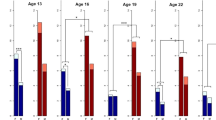Abstract
To examine the development of sex trait stereotypes in Malaysia, 40 5-year-old and 40 8-year-old children were tested with the Sex Stereotype Measurement II. Data were subjected to an item-level analysis, a 2×2×2 mixed design analysis of variance, and cross-cultural comparisons. Results revealed that (1) stereotyping increases with age (p⩽.005), (2) male traits are identified more correctly than female traits (p⩽.005), and (3) boys are more familiar with the male stereotype than are girls (p⩽.025). Cross-cultural comparisons indicate that, relative to 23 other countries, Malaysian 5 year olds produce high stereotype scores but that data from 8 year olds fall more within the median range. The results are interpreted in terms of cognitive development and socialization patterns in Malaysia's multiracial developing society.
Similar content being viewed by others
References
Bandura, A., & Walters, R. H. Social learning and personality development. New York: Holt, Rinehart & Winston, 1963.
Bardwick, J., & Douvan, E. Ambivalence: The socialization of women. In J. Bardwick, (Ed.), Readings on the psychology of women. New York: Harper & Row, 1972.
Barry, H., Bacon, M. K., & Child, I. L. A cross-cultural survey of some sex differences in socialization. Journal of Abnormal and Social Psychology, 1957, 55, 327–332.
Barry, R., & Barry, A. Stereotyping of sex roles in pre-school kindergarten children. Psychological Reports, 1976, 31, 948–950.
Best, D. An overview of findings from children's studies in 23 countries. In R. Rath, H. S. Asthana, D. Sinha, & J. B. P. Sinha (Eds.), Diversity and unity in cross-cultural psychology. Netherlands: Swets & Zeitlinger, 1982.
Best, D., Williams, J., Cloud, J., Davis, S., Robertson, L., Edwards, J., Giles, H., & Fowles, J. Development of sex trait steeotypes among young children in the United States, England, and Ireland. Child Development, 1977, 48, 1375–1384.
Brown, D. G. Masculinity-femininity development in children. Journal of Consulting Psychology, 1957, 21, 197–202.
D'Andrade, R. G. Sex differences in cultural institutions. In E. Maccoby (Ed.), The development of sex differences. Stanford, CA: Stanford University Press, 1966.
Gough, H. G., & Heilbrun, A. B. Adjective check list manual. Palo Alto, CA: Consulting Psychologists Press, 1965.
Hall, M., & Keith, R. Sex role preference among children of upper and lower social class. Journal of Social Psychology, 1964, 69, 101–110.
Hartley, R., & Hardesty, R. Children's perceptions of sex roles in childhood. Journal of Genetic Psychology, 1964, 105, 43–51.
Hartup, W., & Zook, E. Sex role preferences in three and four year old children. Journal of Consulting Psychology, 1960, 24, 420–426.
Hurlock, E. Child development. Singapore: McGraw-Hill, 1978.
Iglitzen, L. A child's eye view of sex roles. Today's Education, 1972, 61, 23–25.
Mead, M. Male and female. Middlesex: Penguin, 1974.
Parsons, T., & Bales, R. F. Family socialization and interaction process. New York: Free Press, 1955.
Rosenberg, B. G., & Sutton-Smith, B. Ordinal position and sex-role identification. Genetic Psychology Monographs, 1964, 70, 297–328.
Rosenkrantz, P., Vogel, S., Bee, H., Broverman, I., & Broverman, D. Sex role stereotypes and self concepts in college students. Journal of Consulting and Clinical Psychology, 1968, 32, 287–295.
Sheriffs, A., & McKee, J. Qualitative aspects of beliefs about men and women. Journal of Personality, 1957, 25, 451–464.
Swift, M. Men and women in Malay Society, In B. Ward (Ed.), Women in the new Asia. Paris: UNESCO, 1963.
Tibbetts, S. Sex role stereotypes in lower grades: Part of the solution. Journal of Vocational Behavior, 1975, 6, 255–261.
Ward, C. Sex trait stereotypes of males and females in Malaysia. In R. Rath, H. S. Asthana, D. Sinha, & J. B. P. Sinha (Eds.), Diversity and unity in cross-cultural psychology. Netherlands: Swets & Zeitlinger, 1982.
Ward, W.D. Patterns of culturally defined sex role preference and parental imitation. Journal of Genetic Psychology, 1973, 122, 337–343.
Wee, A. Chinese women in Singapore: Their present status in the family and in marriage. In B. Ward (Ed.), Women in the new Asia. Paris: UNESCO, 1963.
Whiting, B., & Edwards, C. A cross-cultural analysis of sex differences in the behavior of children aged three through eleven. Journal of Social Psychology, 1973, 91, 17–188.
Wiebe, P. D., & Mariappen, S. Indian Malaysians. New Delhi: Manobar, 1978.
Williams, J. An overview of findings from adult stereotypes studies in 25 countries. In R. Rath, H. S. Asthana, D. Sinha, & J. B. P. Sinha (Eds.), Diversity and unity in cross-cultural psychology. Netherlands: Swets & Zeitlinger, 1982.
Williams, J., & Bennett, S. A definition of sex stereotypes via the Adjective Check List, Sex Roles, 1975, 1, 327–337.
Williams, J., & Best, D. Sex stereotypes and trait favorability on the Adjective Check List. Educational and Psychological Measurement, 1977, 37, 101–110.
Williams, J., Bennett, S., & Best, D. Awareness and expression of sex stereotypes in young children. Developmental Psychology, 1975, 11, 635–642.
Wong, R. The emotional problems of school children. In N. Wagner & E. S. Tan (Eds.), Psychological problems and treatment in Malaysia. Kuala Lumpur: University of Malaya Press, 1971.
Author information
Authors and Affiliations
Rights and permissions
About this article
Cite this article
Ward, C. Sex trait stereotypes in Malaysian children. Sex Roles 12, 35–45 (1985). https://doi.org/10.1007/BF00288035
Issue Date:
DOI: https://doi.org/10.1007/BF00288035




